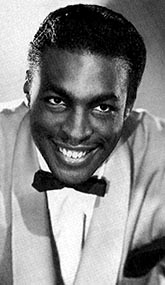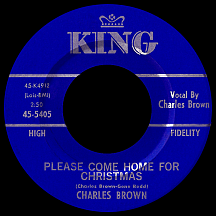CHARLES BROWN
Please Come Home for Christmas
You can refer to Charles Brown as any of the following: a prolific pianist, a blues singer, a jazz singer or even a pop singer (as some at the time of his late-'40s peak compared him favorably, though tenuously, to Bing Crosby). You can also call him a hitmaker, since he was one of the hottest music acts of that era. As the lead singer of Johnny Moore's Three Blazers, he marked his territory in 1946 with "Drifting Blues," a mournful confession of heartache and desolation ('...I ain't got nobody to care for me') that was one of the year's biggest hits on the R&B (then called Race Records) charts.
Charles, a native of Texas City, Texas (just north of Galveston on the Gulf of Mexico), was born in 1922 and raised by his grandparents, who arranged for him to take piano lessons as early as age five. He became familiar with many classical pieces during those formative years; as it is for anyone who starts with the classics, other types of music study come more easily. He attended college in the early '40s and earned a degree in chemistry, working only briefly in that field in addition to taking a job as an elevator operator. Upon moving to Los Angeles in 1943, his considerable talent led to nightclub work, first as a pianist and singer for Bardu Ali's band, followed by a stint at Ivie's Chicken Shack, owned by former Duke Ellington vocalist Ivie Anderson (noted for "It Don't Mean a Thing (If it Ain't Got That Swing)" and other great Ellington hits).
Oscar Moore, guitarist for The King Cole Trio, hired Brown for his group The Three Blazers. Charles made his recording debut on Moore's instrumental disc "Fugue in C Major" (a jazz piano adaptation of Johann Sebastian Bach's classic organ piece) on the Atlas label; the flip side, "Melancholy Madeline," featured vocalist Frankie Laine backed by the Blazers, Brown's piano work prominently on display. Moore, still a member of the Cole Trio, left the small combo in the hands of his brother Johnny, also a guitarist, and it was this configuration (including bassist Eddie Williams) that hit pay dirt with a series of hits as Johnny Moore's Three Blazers. Brown's composition of "Drifting Blues" on a Philo Records 78 kicked off a dozen R&B hits between '46 and '49, though unlike Nat "King" Cole and his outfit, none of their efforts crossed over to the higher-profile pop charts.
The trio recorded for Exclusive Records during this period, occasionally doing sessions for the Modern label. In December 1947 they ventured into seasonal music for the first time with "Merry Christmas, Baby" (penned by Lou Baxter and Johnny Moore), a cheerful, romantic song in contrast to the trio's usual depressing blues (though one line, 'I haven't had a drink this morning but I'm all lit up like a Christmas tree!' suggests a temporary holiday eve reprieve from life's hard knocks); it landed on the R&B best seller charts three straight years and stayed in print for decades, becoming a Christmas standard remade by many artists, the most conspicuous version being Chuck Berry's eleven years later.

Brown felt Moore was receiving most of the credit for the success of the trio and left in 1948 to start his own combo (Williams departed for similar reasons). He signed with Eddie Mesner's Philo label, which had become Aladdin Records by that time, impacting the R&B charts in early 1949 with his first solo single, "Get Yourself Another Fool" (while Exclusive simultaneously released the final recordings he'd done with the Moore Trio). An impressive string of hits followed, every one a slow, desperate, at times haunting, blues number at odds with Brown's real life experiences. "Trouble Blues" caught on like nothing he'd imagined, a number one rhythm and blues hit for more than three months from June through August of '49. After that, any differences Moore or Williams may have had with the singer was treated as water under the bridge, as the two backed him on a number of sessions. Other top-notch musicians who played on Brown's records include saxophonist Maxwell Davis, guitarists Herman "Tiny" Mitchell and Jesse Ervin, bassist Wesley Prince, drummers Jesse Sailes and Johnny Otis, organist Ernie Freeman and vocal group The Song Stylists. Lightning struck again for Brown with "Black Night," another long-running R&B smash that topped the charts between March and June 1951.
After "Hard Times" in early '52 (the first-ever hit for soon-to-be hot producers Jerry Leiber and Mike Stoller), Charles' run of top sellers stalled. He had a couple of releases that year on Swing Time but continued making records for Aladdin until 1956. There were short-lived associations with Hollywood Records (where he rerecorded "Merry Christmas, Baby") and the Cash and Ace labels. After signing with Syd Nathan's King Records in 1960, he and Gene Redd (the company's head of A&R and an accomplished producer) composed "Please Come Home for Christmas." Charles recorded the master in September 1960 at the King studios in Cincinnati, little suspecting that it was the song he would be most remembered for. Unlike his other popular yuletide offering, this song spoke to many about the loneliness the holiday season can bring: 'My baby's gone, I have no friends...to wish me greetings, mmm, once again.'
The single (with Amos Milburn's exuberant "Christmas (Comes But Once a Year)" on the flip side) was a mild R&B hit in December 1960; the following year it gained a foothold on top 40 stations, becoming his only pop hit, with radio play increasing as time went by. After Billboard started publishing its one-month-a-year Christmas chart in 1963, the record ranked high each holiday season, keeping him steadily in demand for live appearances. In 1968, he and Redd were presented with gold records for sales of over a million copies, a result of the record's consistent exposure; "Please Come Home" kept rolling and even hit the number one Christmas survey spot in 1972. "Merry Christmas, Baby" went along for the ride, as the Hollywood remake and newer versions on Imperial and King were also strong sellers in the '60s and early '70s.
Charles Brown continued performing while recording for Galaxy, Bluesway, Jewel and other record labels. He made several well-received blues albums in the '80s and '90s and picked up a Grammy nomination in 1991 for All My Life on the Bullseye Blues label. By that time, "Please Come Home for Christmas" had achieved a special place in music culture. A remake by The Eagles was a top 20 hit in 1978 and since then the song has become part of the repertoire of no less than a hundred major artists, particularly rock and country singers, the lyrical sentiments proving timeless: 'This is Christmas, yes Christmas, my dear...the time of year...to be with the one you love.'


